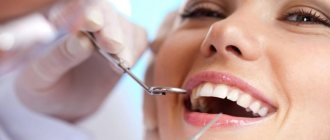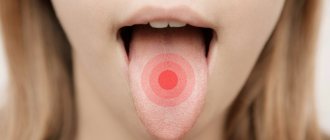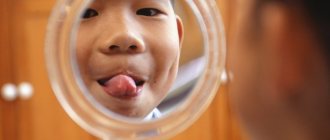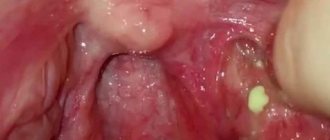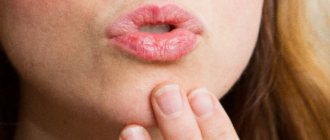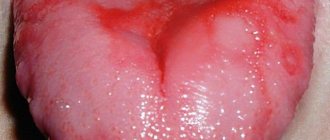Glossalgia is a disease that consists of the appearance of pain and a burning sensation of the tongue in the absence of obvious causes and other clinical manifestations on the mucous membranes. Sometimes similar symptoms spread to the lips, palate or the entire oral mucosa. Middle-aged and elderly women are more often susceptible to this disease; in men it is several times less common.
Unlike other diseases, with glossalgia there are no organic causes of pain. Despite the fact that patients often note the development of pain after injuries, the latter can only act as a trigger factor. The disease should be distinguished from glossitis, an inflammatory disease in which, in addition to pain and burning, external changes in the mucous membranes are observed: redness, ulceration, pronounced plaque, etc.
The tongue itches - what to do if the organ literally itches
The tongue can itch not only in a figurative sense. If you experience unpleasant irritating sensations, the first thing you should do is figure out what could be the reason for the appearance of this symptom. The organ is a muscle containing a huge number of nerves and blood vessels. The occurrence of discomfort, burning, soreness, swelling and itching in the tongue always indicates some pathological condition, and the symptom itself may be associated with dental disease and disturbances in the functioning of internal organs.
Why might my tongue itch?
In any case, if this symptom develops, you should immediately see a specialist. Further in this article we will find out why the tongue may itch, what preconditions contribute to this, and what to do in such a situation.
Symptoms of the disease
Food allergies often appear within a few minutes of consuming the product. There is a rash, itching, redness, swelling of the skin of the hands, face and neck. Many people complain of a sore throat, heartburn, and bloating. Children and adolescents are at high risk of anaphylactic shock, acute urticaria, eczema, and asthma.
In adults, the following symptoms most often develop:
- chronic urticaria;
- atopic dermatitis;
- rhinitis and conjunctivitis;
- gastritis;
- migraine;
- dermatitis.
According to statistics, skin manifestations are observed much more often. The rash is usually erythematous in nature. Elements of the rash can be located on any part of the skin. Dermatological manifestations persist from several hours to several days, then disappear on their own provided there is no further contact with the allergen.
When it enters the body again, the allergy develops again. There is a possibility that each episode will be more severe and intense.
Food allergies cause gastrointestinal problems within the first hours. The following symptoms are usually noted:
- stool disorders;
- abdominal pain, bloating;
- vomiting
With high allergic readiness, these symptoms develop already at the time of consumption of the allergen. It happens that dyspepsia is accompanied by immediate swelling of the mucous membranes of the mouth, lips, and tongue; nasal congestion.
Some varieties of fish, strawberries, and peanuts cause the most severe systemic reactions - angioedema, anaphylactic shock.
People suffering from bronchial asthma or food allergies often experience an attack that develops as a cross-allergy. Headaches, fatigue, and weakness appear after eating potentially dangerous foods.
What can cause an itchy tongue?
A phenomenon such as itching of the tongue and lips can be caused by one of many different factors. Here are the most common causes of this unpleasant symptom:
- mechanical injury: the tongue of both a child and an adult may begin to itch due to banal biting or damage of another nature, for example, as a result of a burn. Very often, the culprit is rubbing the mucous membrane with the sharp edges of a crown, an incorrectly fitted prosthesis or an incorrectly adjusted brace system. Also, this symptom may well be a consequence of the use of low-quality cosmetics or oral hygiene products,
Tongue injury can cause itching
“Somehow this happened to me too. Right in the middle of the day, for no apparent reason, my tongue itched. And let me tell you, this is not a pleasant feeling! And your hands just reach out to scratch at least a little! In general, I immediately decided that it was because of the spicy food, at home I thoroughly cleaned my tongue with a brush, and in the morning the itching appeared again, and most importantly, only on one side. At lunchtime I ran to the dentist, and he immediately said that it was all about the sharp crown. It apparently became so uncomfortably worn over time, and as a result, it scratched the tongue. This is where it started to itch...”
LudaKam, 31 years old, Saratov, from correspondence on a thematic forum
- Oral diseases: one of the most common causes of itching is a disease such as glossalgia. In this case, it is usually the tip of the organ that begins to itch, but in some cases patients experience severe itching on the sides. Associated symptoms include burning, pain, tingling in the tongue, as well as dryness of the oral mucosa. Quite often, the disease develops against the background of strong emotional experiences and stressful situations, but the disease can also be triggered by injury to an organ, taking certain medications, or malfunctions in the internal systems of the body,
The photo shows glossitis of the tongue - Gastrointestinal pathologies: problems in the gastrointestinal tract in most cases are reflected specifically in the condition of the tongue. For example, pathologies such as gastritis, ulcers or pancreatitis can provoke itching and burning in an organ,
- stress and depression: against the background of severe nervous exhaustion, some changes occur in the composition of saliva and the volume of its secretion,
- deficiency of vitamins and microelements: sometimes due to a lack of B vitamins, iron and folic acid, the tongue begins to itch very much,
- allergy: such a manifestation may well be an allergic reaction of the body to some irritant, for example, to hygiene products, the presence of an allergen in the oral cavity in the form of metal parts of braces or a prosthetic device,
- candidiasis: the development of a fungal infection often becomes the body’s response to a sharp weakening of the immune defense. In this case, along with itching, burning and tingling occurs, and a dense cheesy coating appears. Quite often, the cause of this problem is long-term use of antibiotics. By the way, in children the disease in question develops almost twice as often as in adults.
This is what a fungal infection on the tongue looks like
Other possible provoking factors include the constant irritating effect of tobacco smoke, abuse of too spicy, salty or acidic foods - in such cases, it often begins to tingle and itch directly under the tongue. Excessive consumption of low-quality alcoholic beverages can also lead to the development of this symptom.
How does burning in the mouth and tongue manifest?
The symptom is clearly noticeable, may occur sporadically and disappear on its own. This happens when taking bitter medicines or eating spicy foods (“fire” in the mouth). A slight irritation of the mucous membrane may bother you after dental procedures; this is quite normal.
True diseases can be assumed if:
- Dryness and burning in the mouth often appear in certain areas of the oral cavity
- Unpleasant sensations intensify and are accompanied by numbness
- The tingling becomes constant
In most patients, the burning sensation manifests itself in the morning, intensifies during the daytime and subsides towards night.
Appearance in children
Children often face this problem. The appearance of similar symptoms in a child almost always indicates the development of candidiasis. Here it is necessary to conduct a careful visual examination of the oral mucosa for the presence of a dense white coating with a cheesy consistency - this is the very first sign of the pathology in question. If your baby is still very young and cannot tell you about the symptoms that are troubling him, pay attention to whether he is constantly sticking out his tongue. This is how little children usually make it clear that they feel discomfort in the organ.
Stomatitis is common in infants
A common accompanying symptom is burning, and this is a good reason for parents to worry. Here you need to monitor the child’s psycho-emotional state, make sure that he does not experience any serious worries or stress. If you suspect that the cause of the itching lies precisely in the psychological state of the baby, it makes sense to show him to a neurologist. If the diagnosis is confirmed, the doctor will prescribe a course of sedatives. A childhood disease such as scarlet fever can also provoke itching in the tongue and even in the throat. In any case, if suspicious signs of pathology appear, the child should be shown to a doctor as soon as possible.
Diagnostic features
It is important to distinguish glossalgia from organic diseases of the tongue that develop as a result of injuries, neuralgia and neuritis. The doctor will also make sure that there are no bite defects. The main diagnostic criterion for glossalgia is the discrepancy between the sensations of the intensity of the impact. In addition, visible changes in the tongue and mucous membranes are almost completely absent.
In case of injuries, the pain has a clear localization and does not spread beyond the boundaries of the lesion. With neuralgia, sensations occur briefly in the area of innervation of the nerve. With neuritis, pain most often appears only on one side, and is also accompanied by sensory disturbances.
Diagnostic measures
The only correct decision regarding the appearance of the symptoms described above is to contact a knowledgeable specialist. Only a doctor can conduct a competent examination and identify the true cause of the discomfort. Thus, the main diagnostic procedures include:
- general blood analysis,
- taking a swab from the throat.
Tests can determine the true cause of the problem.
Having the test results in hand, the doctor can significantly narrow the range of suspected diseases and even immediately make an accurate diagnosis. It is likely that at the stage of identifying the source of the problem, consultation with highly specialized specialists - a dentist, neurologist, gastroenterologist - may be required. Without knowing the exact doctor’s conclusion, you should not make any attempts to solve the problem yourself, otherwise you can only worsen the situation.
Therapeutic measures – complex treatment
In order to get rid of an annoying symptom once and for all, you first need to identify its root cause, and it is this that needs to be treated. Medications may be prescribed as symptomatic therapy. Typically, complex treatment involves taking antihistamines, antipsychotics, immunostimulants and anti-inflammatory drugs. If the patient has a deficiency of beneficial vitamins and microelements, additional multivitamin complexes may be prescribed to strengthen the body's defenses.
Only a specialist can prescribe the correct treatment
If oral candidiasis is to blame, a specialist may prescribe antifungal agents. It is also mandatory to carry out complete sanitation of the oral cavity in order to eliminate any provoking factors. Other methods of relieving acute symptoms include all kinds of baths and applications using medicinal herbs: wheat germ, rose hips, sea buckthorn oil and others. In this regard, rinsing with a soda solution has worked well - one tablespoon per glass of water. However, it should be understood here that the use of any traditional medicine must first be agreed with the attending physician.
Complications
The most severe complication from strong food allergens is anaphylactic shock. It develops due to hypersensitivity to certain foods or ignoring the first signs for a long time. The entry of an allergen into the human body leads to increased symptoms and further development of shock. The authors Pampura and Khavkin come to the conclusion that “in some patients, anaphylaxis appears only if physical activity is preceded by the consumption of a certain product” (Pampura A.N., Khavkin A.I., 2003, p. 1126).
If the allergy is manifested by vomiting and diarrhea, then prolonged contact with the allergen leads to electrolyte disturbances. They, in turn, often require correction in a hospital setting and also threaten human life and health.
Other complications include the addition of a bacterial infection when scratching the skin, the formation of cross-allergy to pollen or household dust.
Preventive actions
To minimize any risks of developing diseases leading to the symptoms discussed above, you should take care of high-quality and regular oral hygiene. Every day, morning and evening, you should thoroughly clean not only the surface of your teeth, but also your tongue, because a huge amount of bacteria and food debris also accumulate on it. To do this, you can use a regular toothbrush or purchase a special device, such as a scraper.
Regular tongue cleaning will help avoid the problem.
As a preventive measure, from time to time you can rinse your mouth with decoctions of medicinal herbs or special antiseptic solutions, which can be purchased at any pharmacy. And do not forget about the importance of systematically visiting the dentist for preventive examinations.
- Sergeev A.O. Diagnosis and treatment of superficial candidiasis, 2001.

